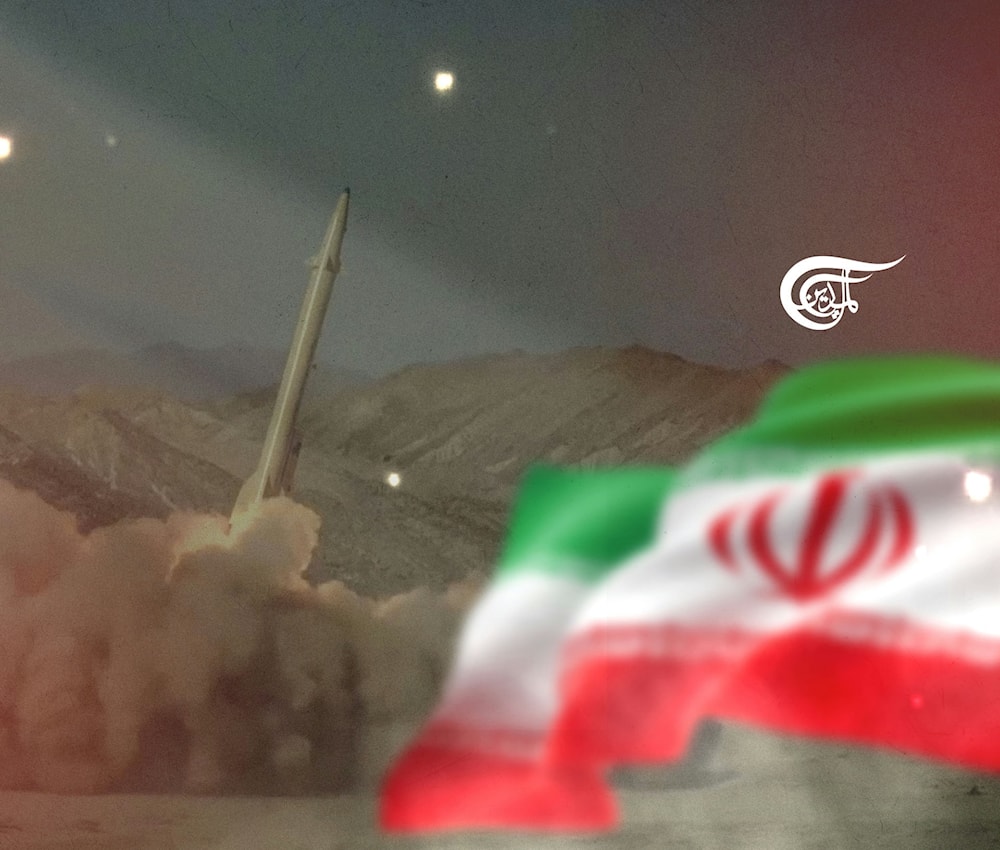Iran’s Historic Attack on 'Israel'
The specter of a wider conflict looms large, with Iran warning of a "much larger" response if "Israel" dares to retaliate, and the United States treading cautiously to avoid being drawn into the fray.
-

The unilateral hegemony of the USA is undergoing a seismic shift, heralding the resurgence of a multipolar world order (Illustrated by Mahdi Rteil to Al Mayadeen English)
Iran's historic attack on "Israel" has reverberated across the region, signaling a potential shift in power dynamics and setting the stage for a new chapter in the Palestinian issue. With the largest-ever drone strike and missile attack in its history, Iran has boldly asserted its military capabilities and confronted its longtime adversary, "Israel", head-on.
The significance of this attack cannot be overstated. For almost half a century, Iran and "Israel" have been locked in a bitter enmity, with tensions simmering beneath the surface and occasional flare-ups threatening to escalate into full-blown conflict. However, this latest strike marks a departure from the past, as Iran directly targets Israeli-occupied Palestinian territory from its own soil, demonstrating a willingness to challenge "Israel's" perceived invincibility.
The timing of the attack is also notable, coming amidst "Israel's" ongoing war on Gaza, Iran's intervention adds another layer of complexity to an already volatile situation, potentially tipping the balance in favor of the Palestinian resistance and reshaping the geopolitical landscape of the Middle East.
Israeli Prime Minister Benjamin Netanyahu's reassurance to his people underscores the gravity of the situation, as "Israel" braces itself for potential retaliation and prepares to defend its territory against further incursions. The specter of a wider conflict looms large, with Iran warning of a "much larger" response if "Israel" dares to retaliate, and the United States treading cautiously to avoid being drawn into the fray.
From a military standpoint, Iran's capabilities are formidable. With one of the largest armed forces in the Middle East, including the Islamic Revolution Guard Corps (IRGC), Iran possesses a diverse arsenal of ballistic missiles and drones, capable of striking targets across the region with precision. Despite facing international sanctions and isolation, Iran has invested heavily in its defense infrastructure, prioritizing domestic production of military equipment to circumvent restrictions and bolster its self-reliance.
Pakistan's tepid response to the attack reflects the delicate diplomatic dance underway in the region. With Pakistan urging "utmost restraint" and emphasizing the need for international efforts to prevent further escalation, the stage is set for a delicate balancing act as regional powers navigate the murky waters of geopolitics.
The unilateral hegemony of the USA is undergoing a seismic shift, heralding the resurgence of a multipolar world order. This transformation is propelled by events such as Iran's recent attack on "Israel". With major players like Russia, China, and now Iran asserting their influence, the balance of power is gradually tilting from the West toward the East.
Iran's bold move in challenging "Israel's" military dominance signals its emergence as a significant regional player, capable of reshaping the geopolitical landscape of the Middle East. This shift challenges the traditional narrative of American and European dominance, paving the way for regional powers to assert their autonomy and shape their destinies.
Moreover, Iran's attack may hasten the process of de-dollarization, as countries seek to diversify their currency reserves and reduce dependence on the US dollar. This trend could further weaken America's grip on global economic affairs, undermining its ability to dictate terms on the international stage.
Simultaneously, "Israel's" image in the Muslim world faces erosion in the wake of the attack, regardless of its success. Iran frames its action as a response to "Israel's" ongoing violations of international law, including its occupation of Palestinian territories and military aggression against neighboring countries like Lebanon and Syria.
This attack also underscores the urgent need for a diplomatic resolution to the Israeli-Palestinian conflict. The shockwaves reverberating from Iran's actions could galvanize international efforts to push for renewed peace negotiations, with a renewed emphasis on Palestinian rights. Additionally, Iran's stance may foster a sense of unity and solidarity among Muslims worldwide, rallying support for the Palestinian cause and prompting greater cooperation among Muslim-majority nations to address common challenges.
The potential economic ramifications of the attack are equally significant, with war analysts predicting a surge in oil prices to $100 per barrel. This could jeopardize key shipping routes and disrupt global trade, further exacerbating tensions in an already volatile region.
In response to the attack, President Joe Biden has conveyed a clear message to Israeli Prime Minister Benjamin Netanyahu: While the US remains committed to "Israel's" defense, it will not participate in any counter-offensive against Iran. This stance reflects a cautious approach by the US administration, as it seeks to avoid being drawn into a wider conflict with Iran.
In conclusion, Iran's historic attack on "Israel" marks a pivotal moment in the Middle East, with far-reaching implications for regional stability, global power dynamics, and the Israeli-Palestinian conflict. As the dust settles, the world watches anxiously. As tensions escalate and diplomatic channels strain under the weight of competing interests, the path forward remains uncertain. However, one thing is clear: the stakes are high, as the events unfolding in the region have the potential to reshape the geopolitical landscape for years to come.

 Ghanwa Mohiyuddin
Ghanwa Mohiyuddin
 5 Min Read
5 Min Read









